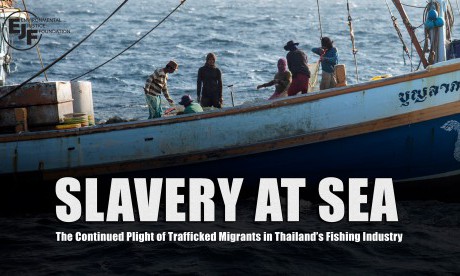Three years ago, worried that his earnings as a builder were barely enough to feed his family, Seuy San began to contemplate his prospects over the border in Thailand.
Like the hundreds of thousands of his fellow Cambodians who migrate in search of work each year, he had a simple but powerful motivation: “I heard there were better jobs in Thailand and I knew bahts were worth more than riels, so I decided to go.”
It was a decision that nearly cost him his life. After chatting with others in his village who had made the journey before him, San waited at the border for two days. When night fell on the second day, he crossed the border into Thailand and then waited another day on the other side. Eventually, a group of men appeared in a large pick-up.
“They used their mobile phones as torches to see which of us looked strong, then they laid us next to each other and on top of each other in the back of the pick-up,” says San.
“There were three layers of us, with the strongest at the bottom. There were about 20 of us in the back and they put a plastic sheet over us and told us not to make any noise.”
Eight suffocating hours later, the pick-up stopped in a forest and San and five other Cambodians were herded into a cage and “locked in so that the police wouldn’t find us”. Behind bars in an unknown forest in a strange land, the negotiations began. San and the others were offered $200 (£132) a month – far more than they would make at home – to work on construction sites in Bangkok.
They accepted, only to discover that they would have to pay their captors-cum-employers $80 for transporting them to the Thai capital, $80 for the correct documents, and $30 a month for basics such as mosquito nets. Continue reading
Sources
- The Guardian. The article is by Sam Jones, a Guardian reporter currently on a secondment on Global development.
- Image: YouTube
